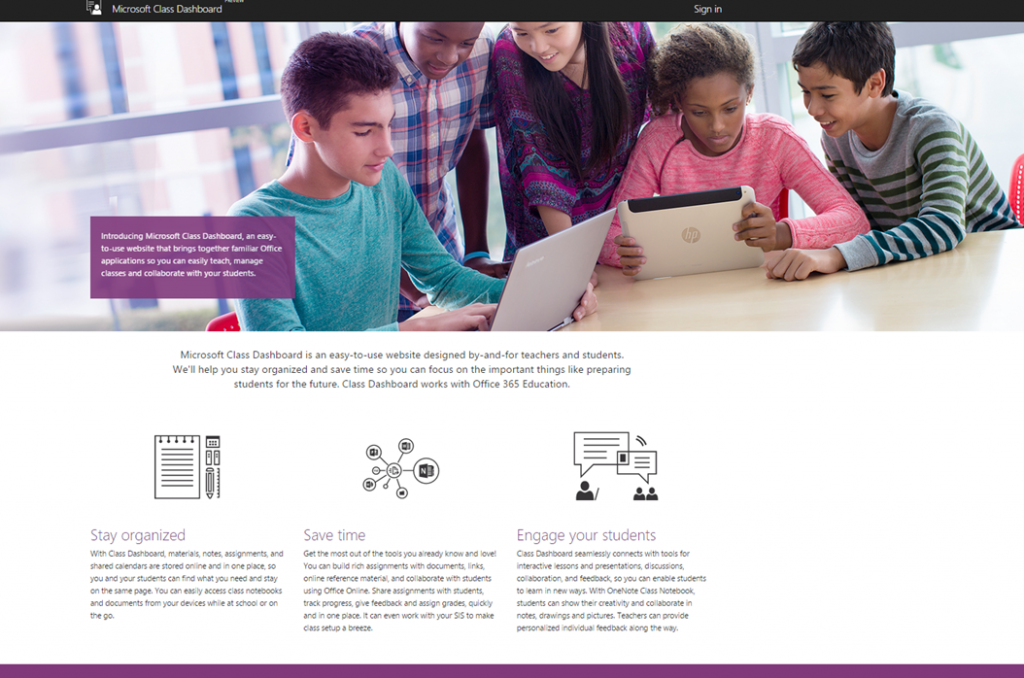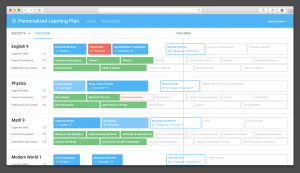Microsoft’s Office software has long been the standard in business and education.
 In a webinar this week, though, Microsoft showcased an online amalgamation of its software that looks very much like a learning management system.
In a webinar this week, though, Microsoft showcased an online amalgamation of its software that looks very much like a learning management system.
Blackboard it isn’t, and that’s the point. Microsoft is drawing on the familiarity and ubiquity of its Office software to create an environment for class materials that is spare, visually appealing, and easy to use – all things that Blackboard isn’t.
The new software, called Class Dashboard (There was a link here, but the page no longer exist), isn’t all that new to many school systems. It has been in beta testing for more than a year, along with data integration software called School Information Sync, but will be made available free to users of Office 365 Education.
Dashboard integrates the company’s Office 365 platform into a portal for displaying class materials, announcements and grades; integrating Office apps; giving feedback to students; managing class rosters and calendars; and integrating discussion boards into assignments.
 All of this is aimed at K-12 education, but it could easily fit into higher education. KU, for instance, has adopted Sharepoint (along with Office 365) for creating internal web portals, and Skype for Business for communication. It will eventually provide OneDrive access across the university.
All of this is aimed at K-12 education, but it could easily fit into higher education. KU, for instance, has adopted Sharepoint (along with Office 365) for creating internal web portals, and Skype for Business for communication. It will eventually provide OneDrive access across the university.
Most universities aren’t likely to shift to Class Dashboard for a learning management system, but it could provide a useful alternative for many faculty members.
Facebook also joined the push toward education with an announcement last week about a school-oriented software project.
The company has been working with Summit Public Schools in California on technology it calls Personalized Learning Plan. Facebook was vague about the specifics of the technology, saying that “content and assessments are delivered online through teacher-created materials.” What it displayed on its blog, though, was a dashboard that allows students to visualize goals, create plans to reach those goals, provide a log of accomplishments, and provide a space for reflection.
The technology is independent of Facebook and doesn’t require a Facebook login. Facebook has been testing the software at Summit since last year, it said, and plans to make it freely available in the future.
Finding your “bliss zone” at the office
If you are feeling miserable at work, it could be that you’ve overshot your “bliss zone,” Arthur C. Brooks writes in The New York Times.
That often happens to ambitious professionals who, he says, keep taking on more responsibility until they suddenly realize that by chasing prestige and responsibility they have given up the work that inspired them in the first place.
Brooks points to academics as one group prone to this phenomenon.
Dan Bernstein, the former director of CTE, passed along a link to Brooks’s article and offered this interpretation from his brother:
“If you can, stay in positions that include activities you find satisfying and valuable. If you need to get into a less enjoyable position to get important things done, then use the mindset of service to get yourself through it.”
Excellent advice.
Strange fact of the week
This has little to do with education and everything to do with marketing and with blind adoption of technology. Fortune reports that in a recent survey, nearly half of Apple Watch owners said that they used their watches more than they expected to – are you ready for this? – check the time.
Briefly …
Most young adults age 18 to 34 reject the label “millennial,” Pew reports, though a large majority of those 51 to 69 embrace the term “baby boomers.” … Few teachers are using social media in their classrooms, The Journal reports, saying teachers worry about a lack of training, and problems that might arise with students’ use of social media. … The New York Times reports that companies are redesigning backpacks to better fit the lifestyle of today’s students, who carry more technology and fewer books than students of past decades. Research for the designs included students, yes, but also mountaineers and homeless people, many of whom have developed methods to keep their belongings portability and dry.
Doug Ward is the associate director of the Center for Teaching Excellence and an associate professor of journalism. You can follow him on Twitter @kuediting.